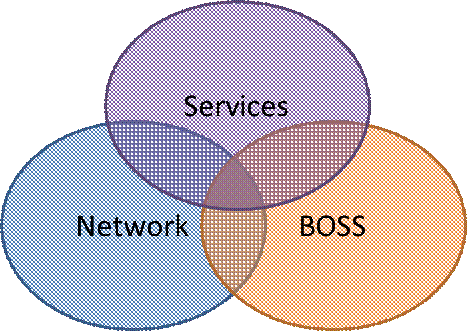Day 1 of the SDP Global Summit kicked off with an impressive line-up of operator case studies from Michel Burger of Vodafone, Medhat Amer of Mobily, Mohammed Aldhwaiyan of STC and Mario Domingo of Globe. Common themes to their success include:
- SDP is not a product, it’s a project covering people, processes and technology (an IT-centric architecture);
- Common theme of a services layer (also called an internet services ecosystem, service
delivery framework.) Its the third leg of an operators business, see diagram
below; - Services layer is not a subset of BOSS (Business and Operational Support Systems), it’s a distinct set of processes and systems in support of services and business model innovation;
- CEO support is essential to deal with the people issues in implementing a services layer;
- Analytics are a critical component of the services layer (we’re finally moving towards Amazon’s model of helping people find stuff they need), and enabling operators to react in near real-time to external events;
- Services layer project is driven by business requirements, technology’s role is purely to fulfill the business requirements;
- Recognition that the web service providers are the competition and they’ve got the services architecture right, hence operators such as Vodafone are adopting their services layer model, using APIs to best harness the assets of Network and BOSS;
- Its an incremental project, not wholesale change. Vodafone’s WOA (Web services Oriented Architecture) approach almost enables a stealth based roll-out;
- Themes of micro-segmentation, recommendations, bundles to deliver more value to customers in near real-time, service innovation, business model innovation; and
- Implementation is quantified at every step with clear KPIs (Key Performance Index), specific savings, clearly addressed revenue leakage and stimulation, some operators sharing figures of 100M Euro in new revenues through their services layer.

In the afternoon I gave an independent review of the M2M market, the presentation shown below covered:
- M2M background examining its long 50 year history, the devices, well-established ecosystems, mobile M2M being a small piece of M2M, standardization, architecture and market size.
- DT, Gemalto and BMW case study
- Quick Operator Activity Round Up (AT&T, Deutsche Telekom, Telefonica, Telenor Connexion, Verizon, Vodafone)
- Battle Over Who Does What (IT Solution Providers versus the Telcos)
- Likely changes in the M2M Market
- Final Note on the Enterprise SDP
Examining where the market is going, two trends will emerge:
- Supply-chain consolidation and realignment. Technology vendors and chip manufacturers will acquire the modem/module manufacturers. IT Solution vendors will acquire platform vendors and ASPs (Application Service Provider) to complete their solutions with horizontal and vertical solutions. Creating solution sets with fleet management, utility management, distribution, asset management, education/government sector, etc. Much like in the IT sector, communications companies like AT&T, Orange/FT, Vodafone and Verizon Wireless will be a channel to market and purely as a network provider.
- Channel empowerment. IBM, HP and the NEPs (Network Equipment Providers) will copy what Cisco did in educating its channel in the “Cisco way” of networking. Using publications and courses to educate an entire generation of networking engineers, in essence making the Cisco way of networking the de facto way of networking. Providing lots of free equipment, training and marketing $$$ to make their technology simply the one the channel knows and trusts best.
The Enterprise problem is different from the consumer problem as enterprises manage their own data and processes. Enterprise middleware is the Enterprise SDP, e.g. Oracle Fusion (which is based on SOA). Generally NEPs (Network Equipment Providers) / Telcos have little credibility in this IT domain with enterprises. They lack IT consulting sales credibility, though NTT, BT and Verizon have aggressive M&A strategies in such IT skill sets.
Operators face a significant challenge to break outside of
connectivity in M2M. They need to focus on verticals and channel management,
both skills in which few operators have achieved success.